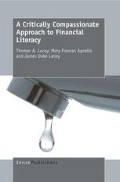Abstract
In this text, we have explored the different areas of financial literacy through a critically compassionate lens. We have considered that developing a sense of personal self-worth that derives from appreciation for oneself offers an alternative perspective from the belief that control of money, things, or people provides a path towards fulfillment.
Access this chapter
Tax calculation will be finalised at checkout
Purchases are for personal use only
Preview
Unable to display preview. Download preview PDF.
References
Armstrong, K. (2011). Twelve steps to a compassionate life. New York, NY: Anchor Books.
Arthur, C. (2012). Financial literacy education: Neoliberalism, the consumer, and the citizen. Rotterdam, The Netherlands: Sense Publishers.
Borg, C., Hallberg, I. R., & Blomqvist, K. (2006). Life satisfaction among older people (65+) with reduced self-care capacity: The relationship to social, health and financial aspects. Journal of Clinical Nursing, 15(5), 607–618.
Bryła, M., Burzyńska, M., & Maniecka-Bryła, I. (2013). Self-rated quality of life of city-dwelling elderly people benefitting from social help: Results of a cross-sectional study. Health and Quality of Life Outcomes, 11(1), 181.
Burton, D. (1995). Women and financial services: Some directions for future research. International Journal of Bank Marketing, 13(8), 21–28.
Conley, D. (2001). Decomposing the Black-White wealth gap: The role of parental resources, inheritance, and investment dynamics. Sociological Inquiry, 71(1), 39–66.
Cutter, S. (2006). The geography of social vulnerability: Race, class, and catastrophe. Retrieved from http://understandingkatrina.ssrc.org/Cutter/
Dickens, C. (2014). Great expectations. New York, NY: Shrine Classics. (Original work published 1860)
Dostoevsky, F. (1994). Crime and punishment. New York, NY: Random House. (Original work published 1866)
Doyal, L. (2001, November 3). Sex, gender, and health: The need for a new approach. British Medical Journal, 323(7320), 1061–1063. Retrieved from http://www.bmj.com/content/323/7320/1061
Freire, P. (1970). Pedagogy of the oppressed. New York, NY: Seabury Press.
Hira, T. K., & Mugenda, O. (2000). Gender differences in financial perceptions, behaviors, and satisfaction. Journal of Financial Counseling and Planning, 13(2), 86–92.
Kincheloe, J. L. (2005). Critical constructivism primer. New York, NY: Peter Lang.
Kincheloe, J. L. (2008). Knowledge and critical pedagogy: An introduction. New York, NY: Springer.
Lucey, T. A. (2005). Assessing the reliability and validity of the jump$tart survey of financial literacy. Journal of Family and Economic Issues, 26(2), 283–294.
Lucey, T. A. (2007). The art of relating moral education to financial education: An equity imperative. Social Studies Research and Practice, 2(3), 486–500.
Lucey, T. A. (2012). Conceptualizing financial morality. In T. A. Lucey & J. D. Laney (Eds.), Reframing financial literacy: Exploring the value of social currency (pp. 47–63). Charlotte, NC: Information Age Publishing.
Lucey, T. A. (in press). In C. Aprea, K. Breuer, P. Davies, B. Fuhrmann, N. K. Koh, J. S. Lopus, & E. Wuttke (Eds.), International Handbook of Financial Literacy. New York, NY: Springer.
Lucey, T. A., & Bates, A. B. (2010). Influences on teacher education majors’ interpretations of financial morality. Citizenship Social and Economic Education, 9(1), 32–43.
Lucey, T. A., Giannangelo, D. M., Hawkins, J. M., Heath J. A., & Grant, M. M. (2007). Morality and money: Relating character and values to financial education in grades K-4. The Forum for Family and Consumer Issues, 12(2). Retrieved from http://ncsu.edu/ffci/publications/2007/v12-n2-2007-summerfall/lucey.php
Lund, D. E., & Carr, P. R. (2008). Doing democracy: Striving for political literacy and social justice. New York, NY: Peter Lang.
Lusardi, A., & Mitchell, O. S. (2008). Planning and financial literacy: How do women fare? (No. w13750). National Bureau of Economic Research.
Macintyre, A. (2008). Whose justice? Which rationality? Notre Dame, IN: University of Notre Dame Press.
McGregor, S. L. T. (2010). Consumer moral leadership. Rotterdam, The Netherlands: Sense Publishers.
O’Toole, T. P., Arbelaez, J. J., & Dixon, B. W. (2004). Full disclosure of financial costs and options to patients: The roles of race, age, health insurance, and usual source for care. Journal of Health Care for the Poor and Underserved, 15(1), 52–62.
Picciano, A. G., & Spring, J. (2012). The great American education-industrial complex: Ideology, technology, and profit. New York, NY: Routledge.
Pinto, L. E. (2013). When politics trump evidence: Financial literacy education narratives following the global financial crisis. Journal of Education Policy, 28(1), 95–120.
Pinto, L. E., & Coulson, E. (2011). Social justice and the gender politics of financial literacy education. Journal of the Canadian Association for Curriculum Studies, 9(2), 55–85.
Romero, M. (1995). Life as the maid's daughter: An exploration of the everyday boundaries of race, class, and gender. In D. C. Stanton & A. J. Stewart (Eds.), Feminisms in the academy (pp. 157–179). Ann Arbor, MI: University of Michigan Press.
VanFossen, P. J. (2006). The electronic republic? Evidence on the impact of the internet on citizenship and civic engagement in the U.S. International Journal of Social Education, 21(1), 18–43.
Author information
Authors and Affiliations
Rights and permissions
Copyright information
© 2015 Sense Publishers
About this chapter
Cite this chapter
Lucey, T.A., Agnello, M.F., Laney, J.D. (2015). Living on the Margins. In: A Critically Compassionate Approach to Financial Literacy. SensePublishers, Rotterdam. https://doi.org/10.1007/978-94-6300-130-4_8
Download citation
DOI: https://doi.org/10.1007/978-94-6300-130-4_8
Publisher Name: SensePublishers, Rotterdam
Online ISBN: 978-94-6300-130-4
eBook Packages: Humanities, Social Sciences and LawEducation (R0)

